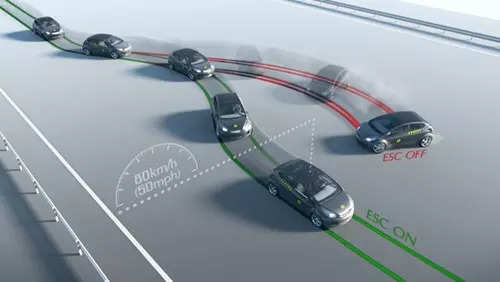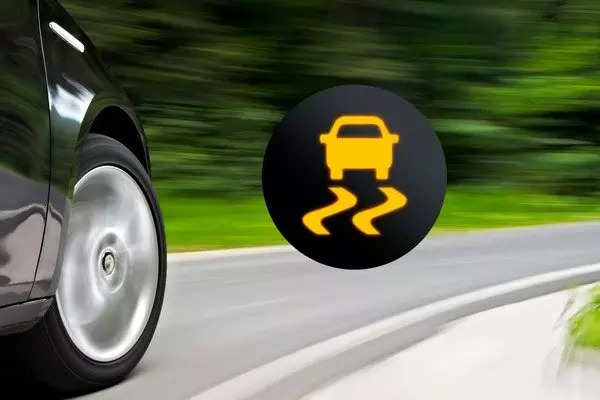
New Delhi: As vehicle safety is taking the centre stage, Electronic Stability Control (ESC) as a safety technology is proposed to be a mandated requirement in all vehicles produced in India.
The ESC is an advanced safety system to control and maintain the lateral stability of a vehicle. During normal driving behaviour, it uses sensors to constantly evaluate the data of the vehicle’s actual behaviour and compares it to the driver’s inputs. In case it detects an unstable state of the vehicle, ESC responds in milliseconds and intervenes by applying braking torques individually to any of the required four wheels to stabilize the vehicle and prevent it from sliding off the road.
Growth of ESC technology penetration in vehicles
| Body type | CY 2020 | CY 2021 | CY 2022 |
| Hatchback | 47% | 40% | 35% |
| Sedan | 12% | 10% | 11% |
| SUV | 29% | 38% | 42% |
| MPV | 12% | 12% | 12% |
Source: JATO Dynamics
As the demand for SUV-styled vehicles has been on a rise during the past 5 years, the penetration of ESC as an offering has also increased from 29% in 2020 to 42% in 2022, across the segment.
Active safety technologies like ESC and Anti-lock Braking System (ABS) actively help the driver to reduce the impact of an accident or even prevent accidents from happening altogether.
CV Raman, Chief Technology Officer, Maruti Suzuki, said, “It is important to look at both active and passive safety in vehicles. We have seen that the active safety features have a larger role to play in prevention of accidents. As an offering, ESC increases the driver’s control by making any sharp braking or sudden manoeuvre.”
The country’s largest car manufacturer offers ESC technology across its range of products now, except the Alto, Espresso and the Eeco. It uses hydraulic systems.
According to the data sourced from automotive research firm JATO Dynamics, the penetration of ESC in passenger vehicles has grown from about 19% in 2020 to 41% in 2022.
Ravi Bhatia, President, JATO Dynamics, said, “The growing adoption of ESC in cars is due to its effectiveness in improving driving safety and reducing accidents.”
“Early adoption of crash avoidance systems like ESC as a standard requirement in new cars will help save thousands of lives. It has the potential to avoid thousands of deaths every year. The government has mandated a requirement for motorcycle ABS, now we encourage the introduction of ESC for cars as an important next step,” he said.
ESC technology penetration across passenger vehicle manufacturers
| OEM | CY 2020 | CY 2021 | CY 2022 |
| Maruti Suzuki | 3% | 7% | 21% |
| Datsun | 13% | 7% | NA |
| Hyundai | 19% | 30% | 42% |
| Mahindra | 19% | 35% | 44% |
| Volkswagen | 20% | 53% | 94% |
| Honda | 25% | 33% | 40% |
| Kia | 29% | 39% | 84% |
| Skoda | 35% | 73% | 100% |
| Ford | 49% | 86% | NA |
| Toyota | 50% | 58% | 65% |
| Nissan | 67% | 58% | 44% |
| Tata Motors | 82% | 76% | 53% |
| MG Motor | 100% | 100% | 92% |
| Jeep | 100% | 100% | 100% |
| Mercedes Benz | 100% | 99% | 100% |
| BMW | 100% | 100% | 100% |
| Audi | 100% | 100% | 100% |
| Volvo | 100% | 100% | 100% |
| JLR | 100% | 100% | 100% |
| Overall Industry | 19.3% | 29.3% | 40.7% |
Source: JATO Dynamics
ZF, which is one of the largest global automotive suppliers of active and passive safety systems, has been working to homologate the buses for ESC. The company supplies to Tata Motors, Ashok Leyland, VECV, Swaraj Mazda and Force Motors. While Force Motors and Swaraj Mazda use the hydraulic ESC, others are using the pneumatic ESC, which is relevant for heavy and medium duty vehicles or if they have an air brake system.
P. Kanniappan, Managing Director, ZF Commercial Vehicle System, said that ESC is a very important technology required to reduce the rollover accidents. “The stability of a moving vehicle is regularly monitored as an external force. In case of the center of gravity of the vehicle falling outside the base of the vehicle, it goes out of control and is not in a stable situation. Then the brake system intelligently detects the situation and accordingly applies the brakes,” he said.
In terms of the size of the business, ESC is not a big volume generator for ZF. The technology is currently applicable to only about 7% of the total volumes for which it supplies components.
Typically, ESC comes with a delta cost of about INR 15,000-16,000 per vehicle. Going forward, the global Tier-I automotive supplier targets to supply ESC technology to about 2500 buses per month.
Industry experts suggest that as the ESC was based on the ABS and it can now be the base to welcome new and advanced technologies. “It is a building block for other technologies, including hill-hold assist, and even Advanced Driver Assistance Systems (ADAS) functions,” CV Raman said.
“ESC is the basic technology to bring other future technologies. In a way ESC is preparing the base for new developments to be applicable to the market, including ADAS which can further offer features like the warning systems, mitigation systems, brake application, autonomous emergency braking systems, lane keep assist etc.,” Kaniappan said.
Meanwhile, for EVs to efficiently use the energy, it is a function of the size of the battery and the coverage of the vehicle. Kaniappan said that EBS (electronic braking system) is a preferable choice for EVs as it saves energy. As a concept it is called regenerative braking.
Regulatory framework
Globally, the European Union (EU) decided to make ESC mandatory in vehicles in 2009. Since November 1, 2011, EU type approval is only granted to models equipped with ESC and since November 1, 2014, ESC has been a mandatory fitment in all new cars in Europe.
In July last year, global automotive safety body Global New Car Assessment Programme (GNCAP) introduced revised testing protocol for markets including India. This is divided into 2 timelines- starting 2022-23, followed by another in 2024-25. For cars to achieve a five-star safety rating, they now mandatorily require the standard fitment of Electronic Stability Control (ESC). GNCAP is a project initiative of UK-based Towards Zero Foundation (TZF).
David Ward, Executive President, TZF, said, “From July 2022, all the cars that we test three main things will be included – they must have Electronic Stability Control (ESC), they will be tested for side impact and also for pedestrian protection.”
GNCAP started testing vehicles in India in 2014. Alejandro Furas, Secretary General, Global NCAP said they noticed that at that time the popular models by price added front airbags as optional, while the side airbags and ESC were an exemption.
“For safety, 2016 was a turning point for us as we have seen that just a single safety feature in a model triggered a larger demand from the consumer for cars with better safety equipment. The recent announcements about BNCAP have made tremendous shifts in the market with the OEMs,” he said.
Last year, the Minister of Road Transport & Highways Nitin Gadkari approved the draft notification for India-specific crash tests- Bharat NCAP (BNCAP).
Following this, in April 2023, the country’s largest carmaker Maruti Suzuki also shared that the Electronic Stability Control (ESC) system has now been equipped across its model lineup.
ESC is yet to be mandated on the truck segment, which is expected in the next 2 years. The government made it a mandatory requirement on buses from April 1, 2023.
ZF said its ESC systems in India are 60% localized. But some parts are being sourced from Europe and China, which the company targets to fully localise by the next 2 years.
“Customers are clearly more willing to pay for such features as there is a growing awareness around the topic of road safety,” Bhatia of JATO Dynamics said.


















